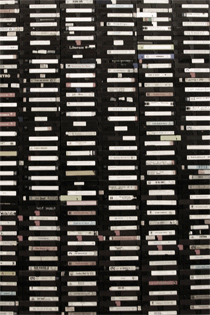Noël Barbe | 04.01.2022
As the process of its reconstruction begins at the end of 2019, the aim here is to grasp the registers and devices through which the burning of a church in the heart of summer 2018, in the department of Doubs, is converted into a public problem in which the ways of problematising it as an event and authorising a reconstruction operate, and in the course of which a series of tests emerges in which the qualities of some and [...]
Yann Calbérac | 04.01.2022
Based on a close scrutiny of Michel Foucault's interview published in the very first issue of Hérodote, a journal dedicated to geopolitical approaches founded by Yves Lacoste, this article unfolds, thanks to the analysis of spatial metaphors, the conceptions and functions of space for the philosopher as well as for geographers. This symmetrical reading enlightens a subtle system of similarities, between Time and Space (two categories rejected by Foucault and the geographers alike, as they abandon grand concepts in [...]
Le poison qui rend fou.
Marinette Lévy | 01.01.2022
Bedbugs and Covid-19 are two seemingly unrelated phenomena. Except for one: their common and similar capacity to make us go crazy. These two plagues, which nothing seems to bring together, pull in fact on the same strings in our minds. If we look at their devastating psychological effects, we discover to what extent human irrationality is activated more than ever in contact with them. Invisible enemies with a galloping contagion, contradictory injunctions, human incapacity to overcome them... Everything is [...]
Jacques Lévy, Olivier Lazzarotti et Xavier Bernier | 01.12.2021
This work experiments with writing constructed by a combination and assembly of cut-out images. The discourse produced is based on a new visual grammar and seeks to show how space is broken up in order to be recomposed. To give substance to this project, a work of expression through images is proposed through a photograph of a district of Tokyo (Japan) likely to allow a kaleidoscopic writing and reading of an urban crossing. [...]
Un état de l’art basé sur le cadre théorique de la motilité.
David Sayagh, Laurent Jardinier et Vincent Kaufmann | 19.11.2021
The objective of this state-of-the-art article is to ask – based on the theoretical framework of the concept of motility – to what extent everyday mobility influences health. It is shown that this influence operates at multiple levels. In particular, following the example of active mobility, mobility can be a source of significant benefits, both in terms of physical health and mental and social health. But daily mobility can also be a source of accidents, air pollution, noise pollution, [...]
Ces morts qui nous habitent.
Jacques Lévy, Olivier Lazzarotti et Xavier Bernier | 01.11.2021
The presence of Freda Josephine McDonald at the Pantheon, France's national necropolis, does not only question the memories attached to each person buried here. It questions the role of the state and that of society as a whole in memorization processes. In addition, as an atypical and unique inhabitant of the place, Joséphine Baker reports significant changes in the choice of the figures honored here. [...]
Yves Winkin | 26.10.2021
The international cultural center of Cerisy-la-Salle (Normandy, France) has been organizing for many years residential, 7-day long conferences from the end of April till the end of September. Participants are hosted in the castle and the adjacent buildings. The author describes his participation to one of those conferences in order to make more concrete what he means by « enchantment », a notion he has been trying to ground for years on the basis of ethnographic accounts. [...]
Thomas Riffaud. 2020. L’espace public artisanal. Grenoble : Elya Éditions.
Kevin Clementi | 11.10.2021
This article reviews the book L’espace public artisanal by Thomas Riffaud (2020). The book offers an interesting point of view by focusing on the figure of the « artisan », a citizen who by his appropriation of public spaces participates in their production. The volume is composed of three parts that describe this ideal-type, and the contours of his action in the contemporary city. Three case studies are also proposed in the last chapter. In this article, we review [...]
Pour débutants avancés.
Xavier Bernier, Olivier Lazzarotti et Jacques Lévy | 01.10.2021
Laughing is a tiny act, but not only. These seven lessons for « advanced beginners » show that models of society and politics are pervasively present in laughing practices and ethics. Moreover, as spontaneous as it may be, laughter has much to do with reflexivity and provides a major contribution in this regard. [...]
Bruno Latour. 2021. Où suis-je ? Leçons du confinement à l’usage des terrestres. Paris : La Découverte.
Olivier Lazzarotti | 28.09.2021
Reading the book “Where am I?” by Bruno Latour convinces that, at least as much as the ecological stake of the planet, it is indeed, in its fullness, the question of inhabiting it which is posed. Can ecological considerations, in particular the apocalyptic announcement of the end, be the exclusive inputs to this issue for all of humanity, that is, each and every one of its members, and well beyond? [...]


